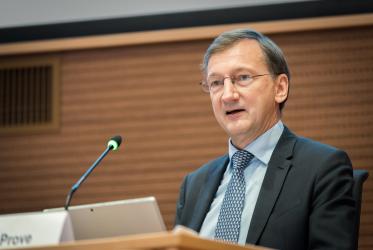Geneva, 17-18 September 2012
The World Council of Churches (WCC) and the Centre for Inter-religious Dialogue of the Islamic Culture and Relations Organization (Tehran, Iran) held their sixth meeting for dialogue in the Ecumenical Institute, Bossey, near Geneva, Switzerland, on 17-18 September 2012 which corresponds to 27-28 Shahrivar 1391. The overall theme for this meeting was “Inter-religious Dialogue and Society: Ways, Means and Goals”.
The meeting was the continuation of the process of dialogue between the WCC and the CID which began in 1995. Participants from the WCC came from Britain, Germany, Iran, Lebanon, Pakistan, Switzerland and the United States. They met with five Muslim scholars and religious leaders who came from Tehran and Qom.
The General Secretary of the WCC, Revd Dr Olav Fykse Tveit, welcomed the Muslim and Christian participants and spoke about the importance of the meeting at this time of considerable tension. During the two days of the meeting participants listened to stimulating papers and reflections exploring various aspects of the overall theme: how to spread the outcomes of inter-religious dialogue and evaluate its impact; the opportunities and challenges involved in conveying the outcomes of dialogue to wider society; the role of key actors from religious, social and academic circles in disseminating inter-religious dialogue; the importance of involving women and young people in promoting the wider acceptance of inter-religious dialogue. The papers reflected the different geographical and social contexts of the participants.
Dr Mohammad Reza Dehshiri, Vice-President of the Islamic Culture and Relations Organisation, Tehran, also shared his vision for dialogue:
· The basic requirement includes Commitment, Cooperation and Comprehensiveness.
· Its methodology should be Reciprocal, Respectful and Representative.
· Its approach required Participation, Proclamation and Promotion.
· Ways for dialogue included Exchange, Education and Evaluation.
· Dialogue needs to Involve people in mutual understanding, offering an Incentive approach, and be an authentically Indigenous dialogue from generation to generation.
The members of the Muslim and Christian delegations emphasized the following points:
· Dialogue is the best means of overcoming misunderstandings and fostering mutual appreciation and peaceful coexistence between the adherents of different religions in today’s multicultural world.
· Dialogue at the theological and philosophical level may result in significant gains in mutual knowledge, understanding and insight about each other’s religion; however, it is also very important to seek to spread the fruits of such personal encounters to the members of wider society.
· We will make every effort to spread peace, friendship and peaceful coexistence among the adherents of different religions by encouraging various forms of dialogue: conceptual, joint social action and in daily life.
· The need to work strategically with various forms of media, to share the results of inter-religious dialogue, was underscored.
· The participants emphasized the importance of encouraging young people to actively take part in inter-religious dialogue and of ensuring that future generations promote the value of peaceful coexistence and respect for their fellow human beings, irrespective of their religion.
· We encourage the active participation of women in inter-religious dialogue at all levels, recognizing women’s previous initiatives.
· We agree that effective dialogue can constitute a significant means to counteract the words and actions of those who incite religious hatred or seek deliberately to dishonour what is sacred to others.
· We encourage inter-religious dialogue in all sectors of society with the aim of involving all in ensuring justice, equality, non-violence, welfare, friendship and compassion in society.
We commit ourselves to taking steps towards the goals and hopes expressed in this communique. When we meet again in 2014 in Tehran will share what has been achieved in various contexts.
Participants
Revd Dr Martin Affolderbach Mr Rasoul Dadashi Azar
Revd Dr Jean-Claude Basset Dr Mohammad Reza Dehshiri
Dr Elias El-Halabi Dr Ali Mohammad Helmi
Revd Bonnie Evans-Hills Dr Mohammad Hossein Mokhtari
Dr Heidi Hadsell Dr Mohammad Saeedimehr
Rt Revd Leo Paul
H.E.Archbishop Sebouh Sarkissian
WCC Staff: Clare Amos; Marietta Ruhland


